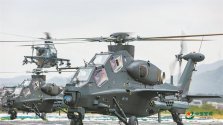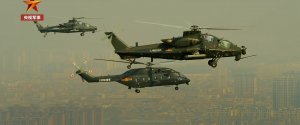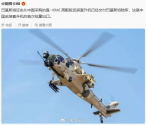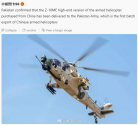Z-10 uses ATGMs that are laser-guided. Z-10 needs to paint the target until the missile hits the target, which means Z-10 will be exposed during the missile’s flight.So there's being recent talks of attack helicopters becoming increasingly obsolete as the role of loitering aerial missile platform is replaced by UAVs. It would appear that attack helicopters are way too expensive to risk in combat given its high vulnerability to missiles.
However, I want to remind everyone that there's one thing that helicopters can do that UAVs cannot, it can use terrain for cover. By lying in ambush behind a hill or treeline, helicopters can lay waste to entire armored column while only exposing itself for less than minute(assuming of course that it has ripple fire + fire and forget Atgms).
I'll also remind everyone that modern air launched Atgms actually outrange most ground based SHORADS, which means that a helicopter can engage ground targets at standoff ranges pretty much indefinitely.
I actually got this by reading ZhiHu, where I heard that during a single helicopter inflicted heavy losses and stopped the advance of an entire Brigade through the careful use of terrain during a PLA exercise. The main difficulty faced by ground troops being that :
-Helicopters can positions itself over steep, difficult terrain so that ground based AA have no hope of closing the distance even if the helicopter doesn't move at all.
-Again, using hills for cover, imagine a dot 3km away spontaneously appearing over a hill for less a minute. Chances are you are never going to see it before the helicopter fires all of its missiles.
Defensive ambush missions is what I believe attack helicopter will excel at in an evenly matched conventional war, aggressively using them in over unsecured or enemy held terrain(unless it's flat terrain devoid of vegetation cover) would quickly result in huge losses. I also imagine unguided rockets and auto cannons will see little use outside of clean up operations.
Again, terrain matters, we've all heard that the flat terrain of Ukraine is favorable to the tank heavy of armies of Russia, but in practice.....Ukraine has trees, lots of them and it heavily restricts engagement and observation distances.
You are using an out of date browser. It may not display this or other websites correctly.
You should upgrade or use an alternative browser.
You should upgrade or use an alternative browser.
Z-10 thread
- Thread starter Red Guard
- Start date
- Status
- Not open for further replies.
KD-X/Y/Z are fire and forgetZ-10 uses ATGMs that are laser-guided. Z-10 needs to paint the target until the missile hits the target, which means Z-10 will be exposed during the missile’s flight.
Doesn't the AKD-10 have LOAL? Z-10 should be able to loft the ATGM in the general direction of the convoy and only need provide laser guidance at the last few moments if the pilot and gunner are experienced.Z-10 uses ATGMs that are laser-guided. Z-10 needs to paint the target until the missile hits the target, which means Z-10 will be exposed during the missile’s flight.
I just kind of thought about it, but would it be possible to make some kind of synthetic diamond glass for the windows?
Would it be stronger better than current tech? What can current windows withstand?
Also, would also be applicable for a lot of ground vehicles as well I suppose.
Would it be stronger better than current tech? What can current windows withstand?
Also, would also be applicable for a lot of ground vehicles as well I suppose.
lcloo
Major
PLAGF Aviation attack helicopters have adopted the combination of drone and helicopter as a team, in that the drone will search for the target and pass the data to the helicopter, the pilot of Z10/Z19 only need to fire their missiles in the direction given by the drone.
Yes, AKD-10 is a fire and forget type of missile. Z10/Z19 pilot can fired and scoot while the drone will stay and observe the result of missile hits.
Yes, AKD-10 is a fire and forget type of missile. Z10/Z19 pilot can fired and scoot while the drone will stay and observe the result of missile hits.
Wire cutter look quite small on the Z-10, They have two on top, one on each cockpit and one on the landing gears. The size of the higher one to protect the rotor is probably restricted to clear rotor bending when doing hard manoeuver. Putting a bigger one behind the cockpit would give better protection.
I don't see one protecting the area of the gun. Most Apache and Cobra variant have one.
According to this post, the first Z-10ME helicopters have been delivered to Pakistan. Can anyone confirm?
(via @斯图卡98 from Weibo)
View attachment 115579
View attachment 115580
PS: I was just checking my sources / contacts too and as it seems, they will only be delivered in the final quarter of 2023.
- Status
- Not open for further replies.




